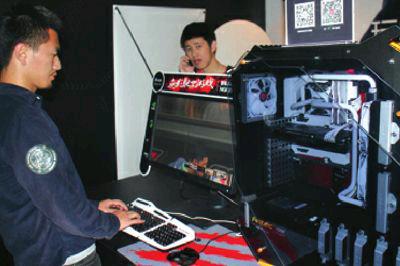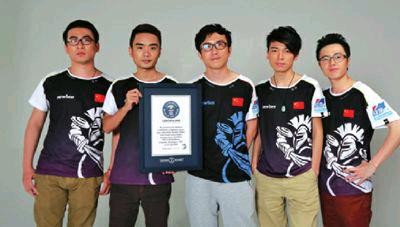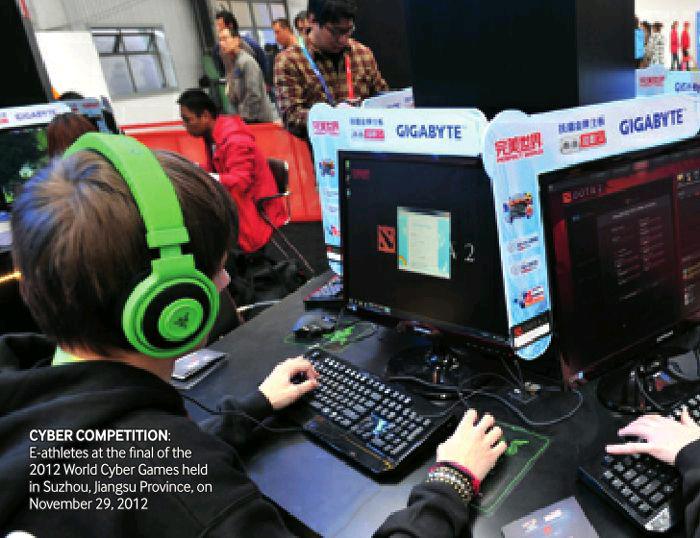Electronic Sports
By+Yuan+Yuan
To parents, computer games mean nothing but bad news for childrens health and their studies. Fans of online gaming, after fighting with their own parents for years, have proved a career in playing games such as Defense of the Ancients 2 (DOTA2), League of Legends (LoL) and Starcraft 2 could even be a lucrative one.
On July 22, the Chinese team Newbee won the International DOTA2 Competition held in Seattle, the United States. The team won $5 million, giving each of the five members $1 million to take home. Four other Chinese teams placed in the top 10 at the event, which was held in a 17,000 capacity stadium and watched online by 20 million unique viewers.
On October 5, Newbee won again at the World Cyber Arena held in Chinas yinchuan, capital city of Ningxia Hui Autonomous Region, netting another 2 million yuan ($330,000).
This team, although formed only in March this year, has won $5.33 million in prize money within seven months.
Games get serious
It is believed that South Korea was the first country where e-sports became a lucrative business. In the late 1990s when South Korea was struggling with the 1997 Asian financial crisis, a new game, called Starcraft, made by U.S. company Blizzard gained notorious popularity among youth at the time. In a bid for more viewers, some Tv channels in South Korea started to make programs about the game. The programs were an unexpected success and spurred a whole chain of profitable enterprises.
By 2004, the annual output of the e-sports industry had reached $4 billion in South Korea, more than even the local automobile industry.
Chinese players saw the potential development of this new form of competition also. In 2000, Starcraft player Han yuliang made a post at a game forum discussing the possibility of training professional Starcraft players. Han even went to Beijing looking for a way to make this idea a reality, but he ultimately failed.
Han was not alone, however. In 2001, a group of game players formed 8DA Club in Chongqing Municipality. It was the first e-sports club in China. Over time, a number of other clubs opened around the country.
In 2003, Chinas General Administration of Sport listed e-sports as an officially recognized sport. The formality made little difference to the situation, however, as at that time the number of people involved in the industry were too few.endprint
In 2008, Wu Sheng, a student majoring in biology in Zhejiang University based in east China, was in the winning team at the DOTA Asian championship at the World Cyber Games(WCG). His team Ehome took home more than 10,000 yuan ($1,631) in prize money. Wus triumph inspired other DOTA players.
In 2009, Wu formed his own team, at first named FTD, but later known as LGD. LGD went on to win the Intel Extreme Masters (IEM) championship in the same year.
When Wu first made waves as a DOTA player, Jian Zihao was only 11 years old. Born in 1997, Jian stepped into the world of e-sports at a young age and was only 15 when he was on the winning team of the League of Legends championship at the Tencent Games Arena(TGA) championship in 2012.
At 16 years of age, Jian and his teammates won the silver medal at League of Legends World Championship in 2013—the biggest event for the game on the e-sports calendar. The result, so far, is still the best result that a Chinese team has ever got in this competition.
“Like other competitive sports, e-sports players also have an age at which they will be in their prime,” said Jian. “I believe it to be about 15-22. Even though I am now 17, I can still feel I am a bit slower than I was last year. The sport demands very fast reactions.”
“There are still many people that cant tell the difference between e-sports and computer games,” said Jian. “At first, my parents were against me playing e-sports games but they changed the attitude after I proved how much I could achieve,” said Jian.
“Many object to us calling it a ‘sport,” said Wang Boqin, Jians teammate who is better known to fans as Tabe, the name he uses while playing. “They say we just play games, how can it be sport?”
Wang retorted by stating that “every sport comes from games, we call the biggest sport competition in the world the Olympic Games.”
The main difference between computer games and e-sports, according to Wang, is esports are a battle of wits and reactions against other humans, rather than a program.
“It is like playing chess. Even when you play chess online, it is still chess,” said Wang.“Succeeding at e-sports requires strategy, cooperation, concentration and many hours of practice. It is a very complex and nuanced sport.”
As a testament to the intense speed at which these games are played, players are often rated by their average actions per minute. In Starcraft, for example, professionals routinely issue 200 to 300 commands in a single minute, which averages between four to five times a second. Korean player Park Sung Joon, a professional Starcraft player for more than 10 years, once reached a staggering average of 818 actions per minute in a match.endprint
“These e-athletes need to practice at least eight hours a day, and these are eight high-concentration hours. It is very tiring,” said Liu Jun, who organized a DOTA competition in 2011 in Dalian, Chinas northern Liaoning Province.“E-sports began to be played in Dalian in 2002 but there are still less than 20 professional players here, and it is difficult for our teams to rank highly in national competitions.”
Liu suggested the sport be only suitable to be taken up by very young people. Before entering competitive play, an e-athlete needs years of practice and experience, with professional training having to begin before the age of 15, which is also a very important age at schools. “If they choose this, they have to quit normal school study, which is also a great pressure not only for them, but also for their parents,” said Liu.
Money meets games
True game lovers make this decision without hesitation, especially since the industry is growing at a breakneck speed.
In 2011, Wang Sicong, son of Wang Jianlin, Chairman of Dalian Wanda Group, set up the Invictus Games (iG) Club and stepped into the sphere of e-sports. The salary he offered to players was several times the market average and quite a few excellent players, including some from well respected teams like Ehome and LGD, transferred to his club.
“The e-sports industry in China is in chaos,”Wang posted on his micro-blogs. “Many players dont get paid properly and clubs dont know how to manage themselves. I believe that with iG, all this will change.”
But the high salary he offered seemed to make things even more chaotic. “The players all of a sudden wanted higher salaries—a lot higher than normal—and they even threatened to leave if I didnt pay enough,” said a club owner who declined to reveal his full name. “Many clubs cant afford to pay better than they do.”
In February 2012, Association of China E-sports (ACE), was formed with hopes to balance and regulate the industry.
On March 19, 2013, the General Administration of Sport announced the forming of a 17-person national team for e-sports, which officially paved the way for development of the sport in China.
Although the players continue to enjoy increasing salaries, commentators earn even more—something else which sets e-sports aside from traditional sports.
Wei Handong, born in 1991, was a League of Legends player for the team WE in 2011, where he only earned 3,000 yuan($490) a month. Even after he won the championship in 2012, his salary was still less than 8,000 yuan ($1,307). Before he announced his resignation in August he was offered 20,000 yuan ($3,268) a month, but now he makes an outstanding 5 million yuan($817,000) a year as a commentator.endprint

To earn this much, Wei does 90 hours of live commentating each month, but it is already much less intense than his time as a professional e-athlete.
“Only players can understand the games and understand how intense the training was,”said Wei, explaining the need for commentators to have a background like his own.
Even so, Weis income is nothing compared to yang Fengzhi, better known as Xiaozhi, who can earn 15 million yuan ($2.45 million) a year as a commentator.
Wu Sheng also chose to be a commentator after he became too old to play competitively. At the same time, he opened an online shop selling e-sports accessories. Each month, the sales at his shop average about 1 million yuan($158,730).
Zhang Xiangling, best known by her online name Xiaocang, is the most famous female e-sports commentator in China. Born in 1983, Zhang began playing e-sports in high school and in 2005, when she was a student at Beijing Normal University, she started a career as an e-sports commentator. In 2008, Zhang was selected as a torch relayer for the Beijing Olympic Games as a representative of e-sports.
Like Wu and yang, Zhang also has an online shop, which brings her more income to supplement that from her commentary.
“E-sports is very different today from how it was in 2005,” said Zhang. “The clubs have now started to package the players, get them dressed up and improve their public image. E-sports players dont have to hide in small shabby Internet cafes any more. It is not a small venture anymore. A top player will have a lot of fans.”
The time is now
Zhou yi, who also graduated from Beijing Normal University, is now the executive chief editor of E-Sports, the first e-sports magazine in China.
Unlike other magazine editors who sit in the office making arrangements, Zhou goes out all the time, carrying his camera and conducting interviews. Zhou said he does this out of his passion for e-sports.
“Many people still have something against e-sports,” said Zhou. “Even mainstream media, when reporting on e-sports, also tend to refer to it as just computer games or a career for ill-educated people. It is understandable if they made this judgment 10 years ago, but if they still think in this way now, it is unfair and even ignorant.”
But Zhou also admitted that most e-sport players, since they are very young, have to be looked after psychologically. “They might give up easily and find it hard to cope,” said Zhou.endprint
For Zhou, many journalists reporting on e-sports would focus on the contradiction between players and their parents or girlfriends. It is rare to see a report on the e-sports as a serious profession.
“People involved in the industry need to shoulder some of these responsibilities,” said Zhou.
When discussing the violent nature of some of the themes in the games used for e-sports, Zhou quoted one father he interviewed in the past: “Compared to the violence in some Tv series and movies, it is not too bad.”
Xinhua News Agency reported recently that Chongqing Energy College has started offering an optional course on the popular computer game DOTA and the course is named “Recent development of electronic sports and analysis of DOTA teams.” The course was an understandable hit, with students scrambling to get a place on the course.
The courses teacher Zeng Qingqing stressed that the content of his class centers on analyzing teamwork strategies, rather than teaching students how to play online games.
“Electronic sport courses can cultivate a way of thinking, a sense of perseverance and teamwork, which are necessary for entering into society,” said Zeng. “Students should view it like other sports courses such as basketball, football and chess.”
In 2011, Zhejiang Sci-Tech University also opened an optional course on e-sports. Zhou Weida, the coordinator, said the courses purpose was to help students relax from the heavy burden of academia. Ninety-five percent of the students in the class are males.
For Pei Le, Chairman of ACE, these classes are a good sign that e-sports are making progress in being more accepted by society. As an e-sports player for more than 10 years, Pei said he feels e-sports are gaining much more popularity compared to the late 1990s when he formed his own e-sports team.
“I hope that with the collective efforts of everyone involved, these sports can recognized by society,” said Pei. “I believe it will happen.”endprint

